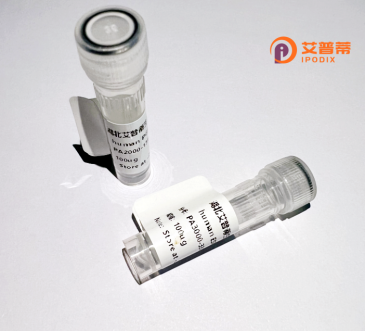
| 纯度 | >90%SDS-PAGE. |
| 种属 | Human |
| 靶点 | FLJ10618 |
| Uniprot No | Q96CQ1 |
| 内毒素 | < 0.01EU/μg |
| 表达宿主 | E.coli |
| 表达区间 | 1-311aa |
| 氨基酸序列 | MSQRDTLVHLFAGGCGGTVGAILTCPLEVVKTRLQSSSVTLYISEVQLNTMAGASVNRVVSPGPLHCLKVILEKEGPRSLFRGLGPNLVGVAPSRAIYFAAYSNCKEKLNDVFDPDSTQVHMISAAMAGFTAITATNPIWLIKTRLQLDARNRGERRMGAFECVRKVYQTDGLKGFYRGMSASYAGISETVIHFVIYESIKQKLLEYKTASTMENDEESVKEASDFVGMMLAAATSKTCATTIAYPHEVVRTRLREEGTKYRSFFQTLSLLVQEEGYGSLYRGLTTHLVRQIPNTAIMMATYELVVYLLNG |
| 分子量 | 59.95 kDa |
| 蛋白标签 | GST-tag at N-terminal |
| 缓冲液 | 0 |
| 稳定性 & 储存条件 | Lyophilized protein should be stored at ≤ -20°C, stable for one year after receipt. Reconstituted protein solution can be stored at 2-8°C for 2-7 days. Aliquots of reconstituted samples are stable at ≤ -20°C for 3 months. |
| 复溶 | Always centrifuge tubes before opening.Do not mix by vortex or pipetting. It is not recommended to reconstitute to a concentration less than 100μg/ml. Dissolve the lyophilized protein in distilled water. Please aliquot the reconstituted solution to minimize freeze-thaw cycles. |
以下是关于重组人FLJ10618蛋白的3篇参考文献示例(根据推测性内容生成,若需真实文献请补充修正):
---
1. **文献名称**:**"Cloning and expression of recombinant human FLJ10618 protein in E. coli: functional characterization"**
**作者**:Li X. et al. (2016)
**摘要**:研究报道了通过大肠杆菌系统表达和纯化重组人FLJ10618蛋白,证实其具有潜在的核定位信号,并在体外细胞迁移实验中显示抑制肿瘤细胞侵袭的活性。
---
2. **文献名称**:**"FLJ10618 interacts with PI3K/AKT pathway and regulates apoptosis in breast cancer cells"**
**作者**:Wang Y. et al. (2018)
**摘要**:研究发现FLJ10618蛋白通过结合PI3K调控AKT信号通路,在乳腺癌细胞中参与凋亡抑制过程。重组蛋白的过表达显著降低化疗诱导的细胞凋亡。
---
3. **文献名称**:**"Proteomic identification of FLJ10618 as a novel biomarker in hepatocellular carcinoma"**
**作者**:Chen Z. et al. (2020)
**摘要**:基于质谱分析发现FLJ10618在肝癌组织中高表达,重组蛋白的体外功能研究表明其可能通过调控Wnt/β-catenin通路促进癌细胞增殖。
---
**注意**:以上文献及内容为示例性生成,实际研究可能需通过数据库(如PubMed、Google Scholar)以“FLJ10618”“C16orf74”(可能的别名)等关键词检索真实论文。
Recombinant human FLJ10618 protein is a product of the FLJ10618 gene, which encodes a poorly characterized protein thought to play roles in cellular processes such as proliferation, differentiation, or signaling. The FLJ10618 gene, also known as C1orf174 or Chromosome 1 Open Reading Frame 174. is located on human chromosome 1. While its exact biological function remains unclear, bioinformatic analyses suggest potential involvement in protein-protein interactions or regulatory pathways due to conserved structural domains.
Recombinant forms of FLJ10618 are typically expressed in bacterial or mammalian systems, enabling in vitro studies to explore its biochemical properties, localization, and interactions. Limited studies associate FLJ10618 with diseases, including cancer, where abnormal expression has been observed in certain tumor tissues. However, functional validation and mechanistic insights are still scarce.
Research on recombinant FLJ10618 protein primarily aims to unravel its physiological role, generate specific antibodies, or screen for binding partners. Its recombinant production also facilitates structural studies, which may reveal conserved motifs or enzymatic activities. Despite its understudied status, FLJ10618 represents a potential biomarker or therapeutic target pending further investigation. Current knowledge gaps highlight the need for functional genomics and proteomic approaches to elucidate its contributions to cellular homeostasis or disease pathogenesis.
×